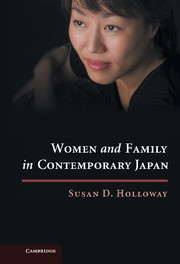4 - Hansei: The Process of Self-Reflection
Published online by Cambridge University Press: 05 June 2012
Summary
Parents are the ones who raise their children. I frequently refer back to that notion. I don't have only the good ingredients needed to be a parent; in fact, I think I have more of the bad ingredients. So I take in this and that, reflect, and look back frequently.
(Yasuko, high school educated, high self-efficacy mother of three)The words of Yasuko, quoted above, speak about the themes explored in this chapter on self-reflection and perceptions of parenting efficacy. When reflecting on her parenting, Yasuko used the term hansei, a complex concept that refers to thinking carefully about something she has done, evaluating whether she has performed well compared to an idealized image of correct behavior, and pondering how she can improve in the future (Heine, Markus, & Kitayama, 1999). The process of hansei is directed toward identifying one's weaknesses rather than enumerating one's strengths, but not in a way that is debilitating. Rather, after engaging in hansei, the individual is supposed to approach new activities with renewed focus and a sense of vigor and confidence. According to Heine et al., “because any discrepancies from the ideal are bound to be negative, Japanese self-perceptions tend to be critical and self-effacing. Yet, this self-criticism is in service of future improvement and achievement of the self” (1999, p. 771).
However, to Western observers familiar with the idea that self-confidence is the key to high achievement, it may seem that focusing on one's weaknesses would lead to low self-esteem, lack of confidence, and impaired performance (Lewis, 1995).
- Type
- Chapter
- Information
- Women and Family in Contemporary Japan , pp. 51 - 72Publisher: Cambridge University PressPrint publication year: 2010

